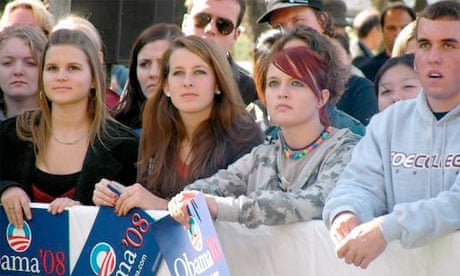The 1990s culture wars were fought over many social issues that many on the right thought were being redefined from their traditional normals by progressive activists and the liberal media for the next generation. Three of the key points of contention were abortion, gay rights, and recreational drug use. The results from last Tuesday's election indicates that the right is losing the war on these three issues.
New voters
Conservatives were fearful that the minds of America's youth (that is, those born in 1980 and after) would be infiltrated by secular, liberal ideology. At the fundamental level of political allegiance, they were right: the great majority of those born in 1980 or after are strongly Democratic-leaning.
The president's anchor among age groups in both 2008 and 2012 was young voters. He won 66% of the votes of 18-24 and 25-29 year-olds in 2008. That percentage shrunk, as he lost support nationwide, to 60% among 25-29 year-olds in 2012 – though this was still more than among any other age group. Importantly, for the long-term Democratic coalition, there was no sign in the exit polls that the Democratic appeal for young voters was abating among those who turned 18 over the past four years: those 18-24 year-old were just as likely to support the president as the 25-29 year-olds.
And those who turned 30 over the past four years have maintained their Democratic allegiance from 2008. The conventional wisdom is that people become more conservative as they age. This isn't borne out in the research, and 2012 is no exception. The only age group whose vote increased for Obama from 2008 to 2012 was 30-39 year-olds, as those who had formerly been 25-29 years old moved into 30-39 year-old age cohort.
Abortion rights
On the issue of abortion, there was no indication that voters had become more anti-legalization over the past eight years. In 2004 exit polls, only 55% of voters felt abortion should be always or mostly legal. This year, 59% held a pro-abortion rights points of view. The introduction of new voters into the electorate has not changed the pro-choice majority that has existed since at least 1975 in the US. Sixty-five percent of young voters in 2012 believed abortion should be legal all or most of the time, which is actually higher than the 58% of those over the age of 30. The exits also fit fairly well with the pre-election polls that have shown the always/mostly legal position on abortion holding steady over the past 20 years.
Gay marriage
This uptick in liberal positions is even clearer with regard to gay rights, perhaps the defining issue of the culture wars. It was less than 20 years ago when the policy of "Don't Ask, Don't Tell" in the military was thought of as a compromise. It was only four years ago when the voters of the progressive state of California amended their state constitution to ban same-sex marriage. Through last Monday, voters in no state had turned down the opportunity to ban same-sex marriage. (Note: Arizona voters did not pass a very restrictive ban in 2006; they did pass a less restrictive same-sex marriage ban in 2008.)
That all changed on election day 2012 when four states chose the more gay-friendly position on same-sex marriage ballot measures. Maine, Maryland, and Washington all approved measures allowing same-sex marriages in their state. Minnesota rejected an amendment aimed at banning same-sex marriage from the state's constitution.
The only reason the pro-gay rights position won in three of the four states is because of voters aged 18-29 years old. That age group supported same-sex marriage in Maine with 68% of their votes, Maryland with 70%, and Washington with 65%. Sixty-seven percent of youth voters rejected the same-sex marriage ban in Minnesota. The anti-same-sex marriage side actually had more support with those 30-plus year-olds and older in Maryland, Minnesota, and Washington. As those born after 1980 become more plentiful in the electorate, we will likely see more victories for same-sex marriage forces.
Marijuana legalization
The issue of marijuana legalization is not quite as polarizing as same-sex marriage, but is still at the forefront for the culture war. Support for weed legalization comes from both liberals and libertarians like Ron Paul and Gary Johnson. Pro-marijuana defenders have made up a fairly steady proportion of the electorate the past few years, after a large uptick since 1990.
Colorado and Washington became the first two states to legalize recreational use of pot last Tuesday by 10 and 11 points respectively. The victory in Colorado was especially noteworthy as it was only six years ago that Coloradans turned down a similar effort by 18 points. Youth voters were for legalization in Colorado by more than 40 points and in Washington by 15 points.
Unlike same-sex marriage, marijuana approval was not as age-divisive and would have passed in both states even if all young voters had stayed home. While youth voters were more likely to be pro-weed in Colorado than any other age group, they were not any more likely to be so in Washington. A recreational pot amendment also failed in the fairly Democratic state of Oregon, though youth support was in the high 50s for it. All of this suggests that while pro-marijuana forces have gained strength, it's not in as strong a position for future years as same-sex marriage now is.
Young and liberal
Overall, the 2012 election demonstrates that the young voters of America not only hold a pro-Democratic party outlook, but one that espouses liberal positions on the important social issues of the day as well.
